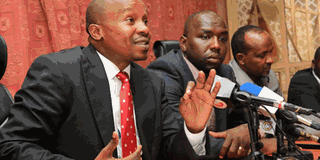Jubilee wants no influence on followers, Kindiki says

Tharaka Nithi Senator Kithure Kindiki (left) with Elgeyo Marakwet Senator Kipchumba Murkomen (centre) and Dujis MP Aden Duale at Parliament Buildings in Nairobi in 2016. PHOTO | JEFF ANGOTE | NATION MEDIA GROUP
What you need to know:
- Tharaka Nithi Senator Kithure Kindiki told the Nation that the Jubilee Party has adopted a strategy to allow its followers to choose their representatives without undue influence from the top leadership in this year's General Election.
- President Uhuru Kenyatta and Deputy President William Ruto are not expected to openly fight independent candidates.
President Uhuru Kenyatta and his running mate William Ruto are coming under increasing pressure to go easy on the restive alliance of independent candidates within the Jubilee Party strongholds.
The President’s handlers are advising him against opening a new war front with the dozens of former Jubilee stalwarts who have bolted out of the party to run as independent candidates following the highly contested party primaries.
Senate Majority Leader and Jubilee National Executive Council member Kindiki Kithure, told the Nation that the party has adopted a strategy to allow its followers to choose their representatives without undue influence from the top leadership in the August 8 General Election.
In effect, the President and his deputy are not expected to openly fight against independent candidates, especially in regions considered to be Jubilee strongholds where a plethora of “friendly” parties have also emerged to support President Kenyatta’s re-election.
The unprecedented strategy is likely to leave the party’s flagbearers suffering a buyer’s remorse after fighting so hard to secure the coveted ticket in the hope of riding on the coat tails of President Kenyatta and his deputy.
A vibrant Kenya Alliance of Independent Candidates, launched at Safaricom Stadium Kasarani in Nairobi last Saturday, had all the hallmarks of a new political movement without a name. It has also become a new third force on the political scene and which seems to have attracted considerable attention from mainstream players who initially sought to frame the 2017 contest as a two-horse race between Jubilee and Nasa ticket holders from top to bottom.
HOSTILE MOVEMENTS
Although the Alliance has pledged to campaign for President Kenyatta’s re-election, its declared agenda, which i to defend Wanjiku’s democratic right to choose her representatives, presents the spectre of two parallel and hostile movements in JP strongholds. Strategists would want to avoid this, especially in playing down the movement’s grievance narrative that the JP primaries were bungled.
The independent movement nominated Kiambu Governor William Kabogo as its leader and spokesman, hoisting him to a platform where he is potentially likely to collide with Jubilee top elections campaign leader, Deputy President Ruto.
To avert possible clashes between the two and their teams, Jubilee seems to have resolved to adopt a conciliatory stance, to accommodate all forces campaigning for President Uhuru’s re-election, regardless of their background or platforms.
“It is a tight rope. The position at the moment is that the voice, sentiments and remarks of the President and his Deputy should seek to carry all of us on board. We leave them to solicit for the Presidential re-election votes from all corners. But they should let Jubilee Party ticket holders for other positions to campaign for themselves,” Prof Kindiki said.
However, the law professor added, once the President and his deputy leave the podium, Jubilee nominees will unleash their trump card and tell supporters that the President needs majority numbers in parliament to be able to implement his agenda.
In Mt Kenya, in particular, Jubilee troops usually campaign for a six-piece voting pattern, citing retired President Mwai Kibaki’s Party of National Unity experience where he had minority numbers in Parliament, and had to limp on a patchwork of small affiliate parties for most of his second term in his tumultuous power struggles with Grand Coalition partners from the Orange Democratic Movement, which had majority members.
ILEGITIMATE IMPOSTORS
On its part, the Alliance for Independent Candidates has sought to paint Jubilee aspirants as illegitimate impostors, “photocopy” aspirants and products of a fraudulent process.
Although the alliance had invited the President to their Kasarani meeting, he did not attend, neither did he send apologies.
“The huge pool of independent candidates has thrown up a dynamic that few had foreseen. It has complicated things more for JP than for the National Super Alliance (NASA), whose top leadership influenced the primaries in their strongholds, while our side largely allowed the widest latitude for voters to decide,” said Prof Kindiki.
An internal Jubilee strategy paper dated 2016 and seen by the Nation, said the governing party might struggle to get an outright first round win, and seemed to agonise over reaching out to non-traditional JP strongholds for support in 2017.
Asked about the party’s strategies to improve its thin victory margin in 2013, in the absence of the emotive International Criminal Court boggy, Prof Kindiki said JP was aware it had to show a good scorecard this year.




